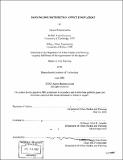Does income distribution affect innovation?
Author(s)
Ratanawaraha, Apiwat, 1972-
DownloadFull printable version (3.808Mb)
Other Contributors
Massachusetts Institute of Technology. Dept. of Urban Studies and Planning.
Advisor
Alice H. Amsden.
Terms of use
Metadata
Show full item recordAbstract
In this study I specify econometric models that test the hypothesis that income distribution affects innovation. The econometric results suggest that countries with more equal income distribution spend more on innovative activity, produce more innovative outputs, and are more productive in producing innovations than those with less equal income distribution. Other significant determinants of innovation include income level, the size of economic activity, and population density. However, my findings indicate that the effects of income distribution on innovation are limited to developing countries. Income distribution, the size of economic activity, and population density significantly affect innovation expenditures only in developing countries. Income level affects R&D expenditures in both developed and developing countries. Regarding the determinants of innovation output level, income distribution affects only developing countries, whereas the size of economic activity affects both developed and developing countries. Income level is not a significant factor in determining the level of innovation output. As for innovation productivity, income level is significant for both developed and developed countries, while income distribution and population density affect only developing countries. The size of economic activity is not a significant determinant of innovation productivity. Income distribution has an effect only on developing countries, because knowledge and information, the essence of innovation, have the properties of increasing returns to scale due to externalities, and increasing marginal productivity. Income distribution affects innovation expenditure, innovation output, and innovation productivity by affecting the aggregate demand composition and human-capital accumulation. Because the market size and the stock of human capital are relatively small in developing countries, income distribution has significant effects on the size of market, the stock of human capital, and therefore innovation.
Description
Thesis (M.C.P.)--Massachusetts Institute of Technology, Dept. of Urban Studies and Planning, 2002. Includes bibliographical references (p. 64-70).
Date issued
2002Department
Massachusetts Institute of Technology. Department of Urban Studies and PlanningPublisher
Massachusetts Institute of Technology
Keywords
Urban Studies and Planning.